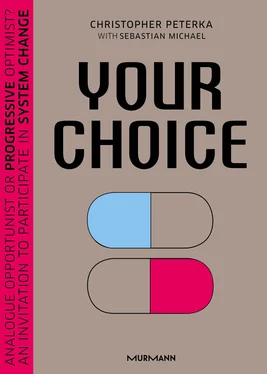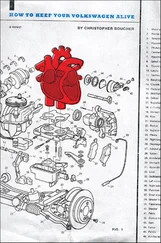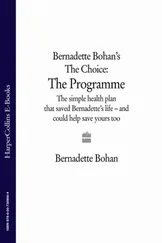There is another troubling flip side to all this: a full-on flattening of the landscape where individual, differentiated voices are increasingly hard to hear, and where few players absolutely monopolise the scene. Google. Apple. Facebook. Amazon. Tencent. Alibaba. GAFATA. Half a dozen corporate entities that control most Internet traffic. And don’t think they don’t control it: the vast majority of us use one search engine, one social network, one online store, for the vast majority of our time online, for the bulk of our purchases. And these are not just surface behaviours. Everything you do is tracked, recorded, monitored, monetised. And used against you. That’s a bit paranoid, you may think. But you’d be wrong. It’s not just targeted advertising and data mining that we are talking about here, but again the potential for—and in parts of the world systematic implementation of—the deep tech state: the Chinese Social Credit System is well underway. By the time you read these lines, its first implementation phase will be complete and fully operational.
Meanwhile, our ›time online‹ has become our time generally. Those of us born before 1980 can recall ›going on the Internet‹. We can sing you the little beep tune modems used to make. Now, we’re never offline. You may not always be looking at your device, but your device is always looking at you: it knows where you are; it tells you when there’s something happening that it thinks you should be aware of; it makes sure you are aware of it, because it wants you to check in. Yes, it may be a dead piece of kit and have no ›will‹ of its own, but it behaves as if it did, because it’s programmed to. All the apps you have on your smartphone make up its central nervous system, and that’s geared to tap into yours as directly, as continuously, and as viscerally as is technologically possible.
These corporate behemoths, how did they grow so big, so fast? By making sure you rely on them. All the time. If your smartphone is the first thing you pick up in the morning and the last thing you put down at night, that doesn’t come about by fluke. Or by astonishing good fortune on the part of the smartphone manufacturers and app developers. It happens by design.
So if you feel addicted to your phone, that’s because you are. You are systematically being hooked to your apps because that’s where revenues come from. It’s not a conspiracy and it’s not a devilish plan by a megalomaniac mastermind, it’s pure commercial imperative: the more time you spend with your phone, the more you are exposed to advertising; the more you interact with your apps, the more information you impart; the more you share, the more accurately your profile can and will be calibrated. And by now, even GAFATA—just like a really good drug dealer—is looking after you, supports you in a managed, stable, and therefore sustainable addiction. With screen time analyses, mindfulness apps, and the occasional reminder to take a deep breath. It’s kind, it’s caring. And it’s also insidious.
And when we say that you’re addicted, this is not a metaphor: you are literally being drugged on your own dopamine. Every time you receive a news item, an update, a new video clip or picture, your pleasure sensors are activated and you release a tiny bit of intoxicating substance into your system. The reason you can’t put down your phone at night is that it’s physically enjoyable to use it. Not because of its haptic qualities—no matter how smooth the casing—but because the apps stimulate your brain into producing hormones that feel nice. True: we’re simplifying things a little here. The neuro-chemical processes are a tad more complex than we make them sound here for ease of use. The principle though is correct: our smartphones are physically, physiologically addictive, because they are designed to be.
You may sometimes hear people say that the Internet has lost its innocence. It’s debatable how much of an ›innocence‹ it ever really had. Its immediate precursor, and the technology from which it has directly evolved, was the ARPANET. In this acronym, NET simply stands for ›Net‹, while ARPA stands for Advanced Research Projects Agency. This was part of and funded by the United States Department of Defense. As a research project, the Net received ARPA backing in 1966, going live for the first time in 1969. By the time it was switched off in 1990, its principal structure and its model for communication protocols had been adopted into the network of networks that is the Interconnected Network, for which we simply say Internet.
This military progeny notwithstanding, it’s true enough to say that the Internet started out with many good intentions, and largely as a commerce-free zone. As late as 1990, Microsoft founder Bill Gates considered the Internet to be for geeks. Between the late 1980s and the mid-1990s there was a virginal adolescence to the Internet, during which it was almost entirely free. There were few pictures, so there was no porn, and there were no merchant tools, so there was no sell. There were mostly people sharing hyperlinks to text-based articles, and newsgroups where the hot topics of the day were discussed. Then, the Internet was ›discovered‹ by business, and brutally commercialised.
But even those days look tame now by comparison to what we have today. Because what we have today is a monstrous manipulation of our ›voluntary‹ behaviour, by corporations and political agitators alike. We’ve hinted before, as many others have said: on Facebook you are the product. For Facebook read Weibo, Instagram, QQ. The reason all these platforms are ›free‹ is that they monetise you. With every picture you upload, every comment you post, every like, every emoji, every interaction, you are being observed. So, yes, the Internet and much of what you find on it is ›free‹, but you’re not. You are being watched. More closely, more intimately, and more pervasively than anyone ever has been, at any given time in history.
[YOU HAVE YOURSELF A WHOLE NEW ORDER OF ORWELL.]
You’ve heard and read stories of surveillance under draconian regimes. They existed and they still do exist to this day, and they’re serious situations where many people suffered and continue to suffer immeasurable deprivation, loss, and hardship. So we don’t mean to belittle or trivialise them. But none of the systems of surveillance of the past came close to garnering the level of personal information that we give away voluntarily all the time now. We have, within two short decades, accepted as normal a reality which another decade before would have horrified people. Then think of what happens when our voluntary behaviour and addiction meet with a Social Credit System and a political model like that of China, and you have yourself a whole new order of Orwell.
And so this is the first question we want to put. To you and to ourselves, because there is no simple answer, and anyone who pretends there is one is either lying or doesn’t understand the issue: what’s the real deal here?
This unbelievable, genuinely amazing convenience that these apps and these networks, these handhelds and these laptops bring me: what do they ask in return? What do I have to surrender? And what does that do to me? Is it necessarily a bad thing that I have no private sphere to speak of? Maybe it isn’t. Maybe it is the case that social cohesion and a code of ethics can in fact be negotiated, even in this world of total voluntary as well as involuntary surveillance. Maybe if everyone knows everything, there opens up a new space for individuality and freedom that we haven’t as yet explored?
And what about the nuisance of being bombarded by ads all the time, intrusively, systematically, obnoxiously? Does it matter? Or is this a small price to pay for free, time-unlimited communication across the globe, with chat, pictures, and video? Is it all right with me if somebody knows and records and analyses and then utilises everything I do, every search term I type, down to the vocabulary I employ in my strictly private messages? Where do I draw the line? Do I have to draw a line?
Читать дальше












